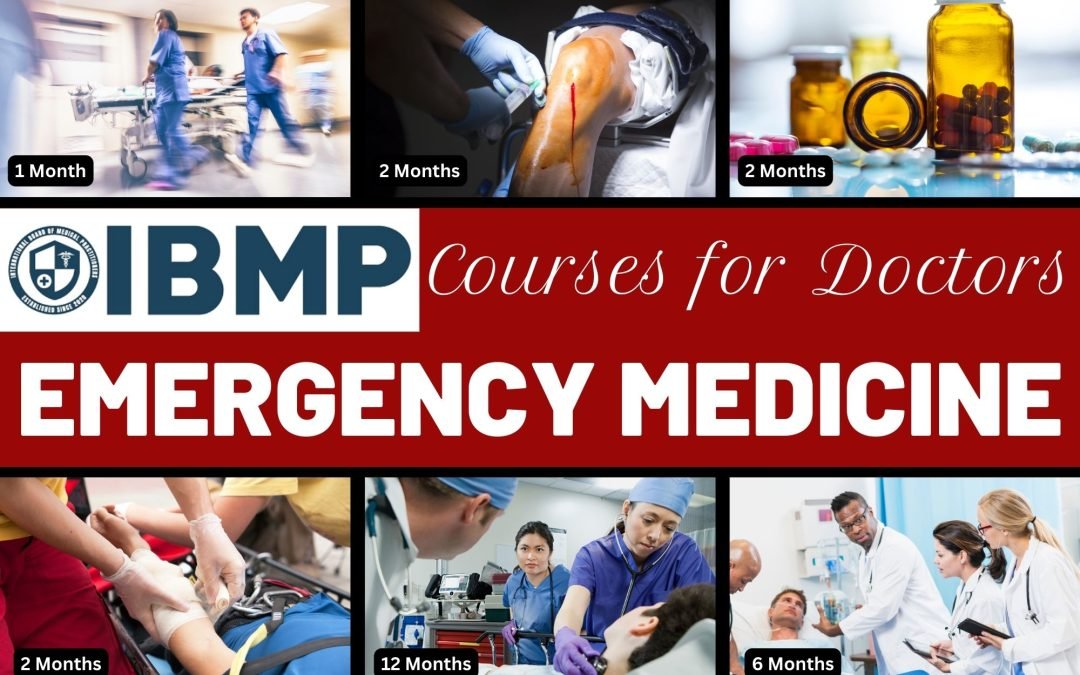Emergency medicine is a specialty that is known for its quick thinking and critical response times in the rapidly evolving field of healthcare, where every second counts. There is an increasing need for highly qualified medical professionals in this discipline as situations get more complicated. A range of Emergency Medicine Certificate has evolved to satisfy this need and help negotiate the complicated world of emergency treatment. Health care professionals can be prepared to tackle critical situations with the information and skills gained from our courses, which include everything from trauma life support to medical toxicology. In this article, we discuss a selected range of courses covering several aspects of emergency medicine, each providing a special viewpoint and set of abilities to physicians looking to succeed in this challenging area.
Whether you are a medical professional looking to enhance your expertise or someone considering a career in emergency medicine, these online certificate courses offer a comprehensive understanding of managing critical situations. Let’s explore some prominent courses in the field of emergency medicine.
Top 6 Emergency Medicine Courses
1. Certificate in Trauma Life Support (1 month Program):
The Certificate in Trauma Life Support (CTLS), which is intended to educate medical professionals “how to handle severe injuries”. Important subjects like initial assessment, airway management, shock, and resuscitation are covered in the curriculum. At the end of this one-month emergency medicine program, participants undergo assessments that evaluate their understanding of trauma care principles and their ability to apply these skills in practical situations. Successful completion leads to the award of the Certificate in Trauma Life Support, a valuable recognition of their expertise in the field.
2. Advanced Certificate in Trauma Management (2 months Program):
The Advanced Certificate in Trauma Management (ACTM) explores deeper into the complexity of trauma cases, building on the foundation created by the Trauma Life Support (Certificate). Advanced patient support techniques, surgical procedures, and long-term care planning are taught to participants. For medical professionals who want to specialize in trauma care, this course is perfect. Participants are introduced to research methodologies and evidence-based practices in trauma management. Thorough evaluations are carried out at the end of the two-month Advanced Certificate in Trauma Management program to evaluate participants’ understanding of advanced trauma care fundamentals. Upon successful completion, the participant received the Advanced Certificate in Trauma Management, which confirms their improved abilities and knowledge in managing situations with complex trauma.
3. Certificate in Medical Toxicology (2 months Program):
Toxicological emergencies require a specific skill set, and the Certificate in Medical Toxicology (CMT) equips healthcare professionals with the knowledge to handle cases involving poisoning, overdose, and exposure to toxic substances. This short term course covers the identification of toxins, appropriate treatment modalities, and preventive measures. Participants learn to identify common toxins, including chemicals, pharmaceuticals, and environmental substances. The program explores the diverse ways in which toxins enter the body, emphasizing the importance of accurate and timely diagnosis.
4. Certificate in Accident Medicine (2 months Program):
Accident Medicine focuses on the entire management of injuries resulting from accidents. The Certificate in Accident Medicine (CAM) provides a multidisciplinary approach to understanding accident dynamics, injury patterns, and effective treatment strategies. This course is beneficial for emergency room physicians, trauma surgeons, and other healthcare providers dealing with accident-related cases. This 2 months of certificate program emphasizes the importance of rapid and effective emergency procedures in accident cases. Participants acquire skills in managing life-threatening injuries, initiating resuscitation measures, and stabilizing patients in the critical initial phases.
5. Fellowship in Emergency Medicine (12 months Program):
For those aspiring to become leaders in the field of emergency medicine, a Fellowship in Emergency Medicine (FEM) offers an advanced and in-depth understanding of various emergency scenarios. This program typically includes hands-on experience, research opportunities, and exposure to a wide range of emergency medicine subspecialties. Participants work in various settings, such as emergency departments, intensive care units, and trauma centers, gaining practical training under the mentorship of seasoned emergency medicine specialists. Successful completion of a Fellowship in Emergency Medicine is a significant achievement, often resulting in the award of a fellowship certificate or diploma. This recognition serves as a testament to the participant’s advanced knowledge, skills, and dedication to excellence in emergency care. Furthermore, a fellowship is a prestigious credential that can enhance career prospects, opening doors to leadership positions, academic roles, and specialized practice opportunities.
6. Certificate in Emergency Medicine (6 months Program):
Foundational course, the Certificate in Emergency Medicine (CEM) covers essential topics such as emergency procedures, patient assessment, and basic life support. This course is suitable for medical professionals at the early stages of their careers or those transitioning into emergency medicine. Over the 6 months certification program, participants undergo a structured curriculum that covers key aspects of emergency medicine. The program includes thorough training in BLS and ACLS, essential skills for any healthcare professional working in emergency medicine. Participants learn to recognize cardiac emergencies, administer CPR, and manage advanced life support scenarios.
Conclusion:
Courses in emergency medicine play a crucial role in preparing healthcare professionals to handle a wide array of critical situations. Whether you are looking to specialize in trauma, toxicology, or accident medicine, these courses provide the knowledge and skills necessary to excel in emergency medicine. Continuous education and training are key to staying at the forefront of this dynamic and vital aspect of healthcare. As emergency medicine continues to evolve, these certification courses remain essential. Shaping the future of healthcare professionals and enhancing the overall capacity to save lives when every second counts.
Our carefully curated programs, ranging from the foundational Certificate in Emergency Medicine to the advanced Fellowships. Specialized Certificates in Trauma Life Support, Medical Toxicology, and Accident Medicine, offer a comprehensive pathway for healthcare professionals.
Connect with our admission counselor for more details at +1 (302) 302-0293
or Visit our official website at www.ibmpractitioner.com
Follow us on Facebook for daily updates – IBMP(USA)

